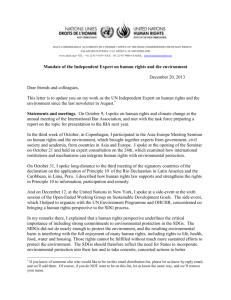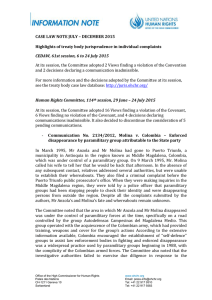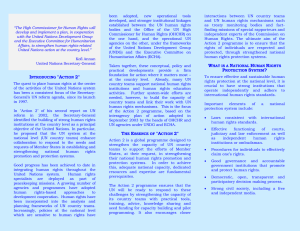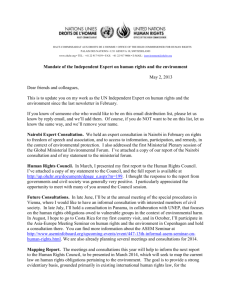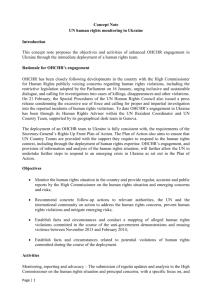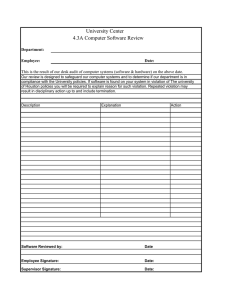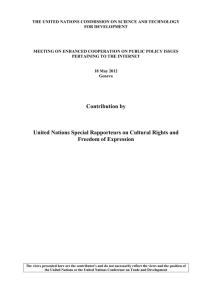CASE LAW NOTE JANUARY – JUNE 2015 CEDAW, 60
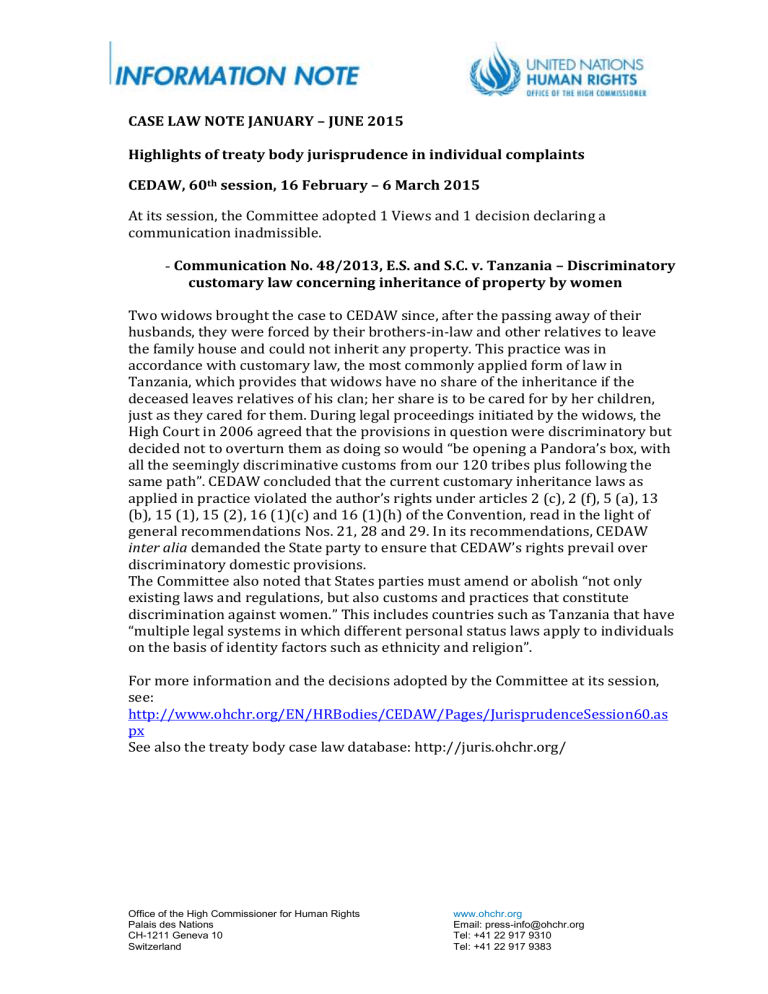
CASE LAW NOTE JANUARY – JUNE 2015
Highlights of treaty body jurisprudence in individual complaints
CEDAW, 60 th session, 16 February – 6 March 2015
At its session, the Committee adopted 1 Views and 1 decision declaring a communication inadmissible.
-
Communication No. 48/2013, E.S. and S.C. v. Tanzania – Discriminatory
customary law concerning inheritance of property by women
Two widows brought the case to CEDAW since, after the passing away of their husbands, they were forced by their brothers-in-law and other relatives to leave the family house and could not inherit any property. This practice was in accordance with customary law, the most commonly applied form of law in
Tanzania, which provides that widows have no share of the inheritance if the deceased leaves relatives of his clan; her share is to be cared for by her children, just as they cared for them. During legal proceedings initiated by the widows, the
High Court in 2006 agreed that the provisions in question were discriminatory but decided not to overturn them as doing so would “be opening a Pandora’s box, with all the seemingly discriminative customs from our 120 tribes plus following the same path”. CEDAW concluded that the current customary inheritance laws as applied in practice violated the author’s rights under articles 2 (c), 2 (f), 5 (a), 13
(b), 15 (1), 15 (2), 16 (1)(c) and 16 (1)(h) of the Convention, read in the light of general recommendations Nos. 21, 28 and 29. In its recommendations, CEDAW
inter alia demanded the State party to ensure that CEDAW’s rights prevail over discriminatory domestic provisions.
The Committee also noted that States parties must amend or abolish “not only existing laws and regulations, but also customs and practices that constitute discrimination against women.” This includes countries such as Tanzania that have
“multiple legal systems in which different personal status laws apply to individuals on the basis of identity factors such as ethnicity and religion”.
For more information and the decisions adopted by the Committee at its session, see: http://www.ohchr.org/EN/HRBodies/CEDAW/Pages/JurisprudenceSession60.as
px
See also the treaty body case law database: http://juris.ohchr.org/
Office of the High Commissioner for Human Rights
Palais des Nations
CH-1211 Geneva 10
Switzerland www.ohchr.org
Email: press-info@ohchr.org
Tel: +41 22 917 9310
Tel: +41 22 917 9383
Human Rights Committee, 113 th session, 16 March – 2 April 2015
At its session, the Committee adopted 14 Views finding a violation of the Covenant,
2 Views finding no violation of the Covenant, and 10 decisions declaring communications inadmissible. It also decided to discontinue the consideration of 5 pending communications.
- Communication No. 2091/2011, Gardner v. Canada – Deportation of a
mentally-ill person found to be a violation of article 7 of the Covenant
The case was brought on behalf of a mentally ill person, who was born in Jamaica but had lived in Canada since the age of 18, during more than 30 years, until his deportation to Jamaica on 29 August 2011. In 1993, he was diagnosed with paranoid schizophrenia. On 23 March 2006, he was reported as inadmissible in
Canada on the grounds of serious criminality. A causal connection between the author’s criminality and his illness was medically recognized. The Committee determined that “the deportation to Jamaica of the author, a mentally-ill person in need of special protection who lived for most of his life in Canada, on account of criminal offences recognized to be related to his mental illness, and which has effectively resulted in the abrupt withdrawal of available medical and family support on which a person in his vulnerable position is necessarily dependent, constituted a violation by the State party of its obligations under article 7 of the
Covenant”.
- Communication No. 2001/2010, Q v. Denmark – Refusal to provide reasons for the refusal to grant an exemption from language requirement for obtaining citizenship
An Iraqi refugee, who had lived in Denmark since 1998, had applied for citizenship in 2005, and asked to be exempted from the language requirement on medical grounds, as he was suffering from severe psychosis, aural hallucinations, depression and various physical disorders. The Naturalization Committee of the
Danish Parliament may grant such exemptions if an applicant documents that they suffer from a serious physical or mental illness, meaning they are incapable of, or have no reasonable prospects of, acquiring the required Danish language skills. In
2008, the Naturalization Committee refused Q’s request but gave no reason. The
Committee noted that, according to Denmark’s own submission, the exemption provision was open to interpretation and practice was laid down by the majority of the Naturalization Committee at any time. The Committee considered that the lack of motivation of the decision and transparency of the procedures make it very difficult for Q to submit further documentation in order to support his request, as he did not know the real reason for the refusal. While countries are free to decide their criteria for granting citizenship, in this particular case Denmark had failed to show that its refusal to exempt Q from the language requirement was “based on reasonable and objective grounds” and the Committee concluded that his right to equality before the law and equal protection of the law under article 26 of the
Covenant had been violated.
For more information and other decisions adopted by the Committee at its session, see: http://www.ohchr.org/EN/HRBodies/CCPR/Pages/Jurisprudence.aspx
See also the treaty body case law database: http://juris.ohchr.org/
CRPD, 13 th session, 25 March – 17 April 2015
At its session, the Committee adopted 1 Views finding no violation of the
Convention and 1 decision declaring a communication inadmissible.
For more information, see: http://www.ohchr.org/EN/HRBodies/CRPD/Pages/Jurisprudence.aspx
CAT, 54 th session, 20 April – 15 May 2015
At its session, the Committee adopted 5 merits decisions finding a violation of the
Convention, 8 merits decisions finding no violation of the Convention. It also decided to discontinue the consideration of 11 pending communications.
-
Communication No. 456/2011, Guerrero Larez v Venezuela – Enforced
disappearance in prison
In complaint 456/2011 against Venezuela, the Committee found that the disappearance of an inmate of the Venezuelan General Penitentiary constituted an enforced disappearance and, in the circumstances of his case, an act of torture within the meaning of article 1 of the Convention. Relatives of Mr Guerrero Larez alleged that they received information from other inmates that indicated that he had become a victim of reprisals by a group of inmates of the prison because he knew about illegal activities that the group was conducting with the complicity of the National Guard commander. He had reportedly been murdered, dismembered and buried within the premises of the Penitentiary. Despite the complainants’ efforts, the authorities did not investigate. In its decision, the Committee observed that the authorities had not provided any information regarding possible steps they may have undertaken to establish Mr Guerrero Larez’s whereabouts; nor had it been determined whether the prison authorities and National Guard bear any responsibility in the matter. In particular, no steps were taken to clarify whether
Mr. Guerrero Larez’s disappearance was intended as a punishment or form of intimidation because he knew about alleged illegal activities conducted by a group of inmates in complicity with certain authorities. The Committee therefore found a violation of articles 2.1, 11, 12 and 14, read separately and in conjunction with article 1, of the Convention in relation to Mr Guerrero Larez, and of article 16 of the
Convention in relation to his relatives.
For more information and other decisions adopted by the Committee at its session, see: http://www.ohchr.org/EN/HRBodies/CAT/Pages/Jurisprudence.aspx
See also the treaty body case law database: http://juris.ohchr.org/
CERD, 86 th session, 27 April – 15 May 2015
At its session, the Committee adopted 1 opinion finding a violation of the
Convention.
For more information, see: http://www.ohchr.org/EN/HRBodies/CERD/Pages/Jurisprudence.aspx
See also the treaty body case law database: http://juris.ohchr.org/
CESCR, 55 th session, 1 – 19 June 2015
At its session, the Committee adopted 1 Views finding a violation of the Covenant.
-
Communication No. 2/2014, I.D.G. v Spain – Lack of proper notification leading to deprivation of the possibility to defend right to housing in
judicial proceedings
Ms I.D.G. had purchased a house taking a mortgage loan from a bank in 2007. Due to her failure to make several payments, the lending institution called in the full amount of the loan and initiated a special mortgage enforcement procedure in court in Madrid. However, Ms I.D.G. only became aware of the existence of the proceedings several months later. According to the information provided to the
Committee, a court’s agent went to Ms. I.D.G.’s house four times to personally notify her of the bank’s application and the starting of the procedure, but did not find her at home. The court then decided to post the notification on the court notice board and to consider that the process of notification had been completed.
Several months later, the court ordered the auction of the mortgaged property, and again Ms. I.D.G. was not personally notified, as she was not at home when the court’s agent arrived to serve process. However, during this second attempt, the court’s agent left a notice at her home inviting her to collect the notice, which she did. Ms. I.D.G. claimed that it was only then that she was apprised of the mortgage enforcement proceedings and that in the absence of an effective notification of the bank’s claim and the start of the proceedings, she had not been given the opportunity to defend her rights.
The Committee considered that in mortgage foreclosure proceedings, service of process through public notice must be strictly limited to situations in which all means of serving process in person have been exhausted, and its exposure must be sufficiently visible and prolonged so that the affected person has the opportunity to become fully aware of the initiation of the proceedings and can attend them. It concluded that Spain violated article 11.1, read in conjunction with article 2.1, of the International Covenant on Economic, Social and Cultural Rights because its courts had failed to take all reasonable measures to adequately notify Ms. I.D.G. that the lending institution had filed a mortgage foreclosure claim against her. As a consequence, she was deprived of the possibility to adequately defend her right to housing in judicial proceedings. The Committee requested Spain to adopt appropriate legislative measures to ensure that the rules concerning mortgage enforcement proceedings contain appropriate requirements and procedures to be followed before going ahead with auction of a dwelling, or with eviction, in accordance with the rights enshrined in the Covenant.
For more information, see: http://www.ohchr.org/EN/HRBodies/CESCR/Pages/TableJurisprudence.aspx
